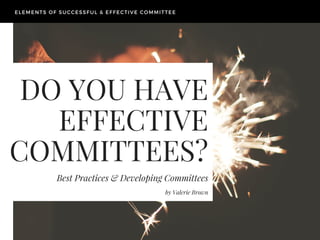
Effective Committees
- 1. DO YOU HAVE EFFECTIVE COMMITTEES? Best Practices & Developing Committees ELEMENTS OF SUCCESSFUL & EFFECTIVE COMMITTEE by Valerie Brown
- 2. A COMMITTEE IS A GROUP OF PEOPLE APPOINTED FOR A SPECIFIC FUNCTION, TYPICALLY CONSISTING OF MEMBERS OF A LARGER GROUP. WHAT IS A COMMITTEE? AND WHAT IS THEIR ROLE? Committees can be the lifeblood of an Association and are critical to your Boards Success. Committees are created by the Board, to assist the Board in tackling and addressing specific tasks. The committee can be used in a variety of ways, one is to tackle problems or handle operations within the Community, the other can be in an advisory role for the betterment of the entire association. Committee member involvement helps build the Community bonds and fosters relationships between the entire Community and the Association. Aside from fulfilling a specific role in the functioning of the Association and addressing an identified need; the committee's contributions help the Board of Directors to fulfill its role more efficiently. The Board is able to hear input and different viewpoints, not just from the members of the committee itself but also as a voice for their friends and other Community members, who may not be actively involved, or feel comfortable voicing out their concerns.
- 3. WHAT IS A COMMITTEE? AND WHAT IS THEIR ROLE? Standing Committees are permanent, meet, and take action regularly. Typically seen Standing Committees are Architectural Review Committees, Compliance Committees, Social Committees, Parks and Recreation Committees and some may even deal with issues like finance, communications, & maintenance and operations. Ad-Hoc Committees are committees formed with the purpose of addressing a specific issue, and is disbanded once its function is achieved. Typical Ad-Hoc Committees examples are an election committee, budget committee, a event committee or a specific issue committee ("insert issue name here" committee). Committees also allow the Board to remain focused on their role of governance, rather than becoming overwhelmed or too consumed by various projects, details and tasks. Most committees are assigned projects or operational functions, which can include gathering information, assessing specific issues or concerns and making recommendations to the Board. Committee members are volunteers who own a home within the Association, who donate their time to the issues the specific committee is tasked with resolving. Association committees can vary quite a bit and there are two types, standing & ad-hoc.
- 4. COMMITTEE ROLES & RESPONSIBILITIES Establishing a well-defined committee charter and committee code of conduct plays a critical role in the committees success. This helps give a formal description of what is expected from each committee to guide the members. Equally important to this is recognizing committee members duties and assuring they understand their role thoroughly so they can be effective. Written Charters & Code of Conduct Specific Committee Duties and Members Roles Adequate introduction to committee responsibility Ensure Chair understands role, process and can convey to other members their role. Communicate with members regularly regarding upcoming projects. If privacy laws allow, provide an agenda in advance to your committee for review. COMMITTEE ROLES & RESPONSIBILITIES
- 5. ADDITIONAL TOOLS FOR COMMITTEE SUCCESS Prepare orientation for new committee members Provide regular and appropriate recognition to active committee members. Involve committee members in developing an annual committee plan of work and make sure that the committee plans are in alignment with overall association plans. At every meeting have a committee meeting feedback form. Set an attendance requirement for the committee Make evaluations a part of the charter or make terms good for one year. TOOLS TO BUILD COMMITTEE SUCCESS
- 6. Is your committee flat lining? Understanding that not all committees flourish right away, the insight as to why, and what you can do about it, becomes very important. Typical reasons include: WHY A COMMITTEE FALLS APART REASONS WHY A COMMITTEE MAY NOT SUCCEED. Unclear or Ineffective Committee Description Unclear standards of Committee Conduct Discussions consist of off task unrelated small talk. Agenda not properly followed Vague & undefined motions (improper Roberts rules) Monotony No recognition or appreciation Lack of experience by the Chairman can lead to poorly run meetings. Active participation is declining Member aggression or conflict
- 7. SURVEYING YOUR ENVIRONMENT . A Sample Survey & Checklist for Committees SURVEYS & CHECKLISTS
- 8. SAMPLE Committee Name Feedback Survey Rank 1-10 With 1 being the lowest score and 10 being the highest score, please rank each category accordingly. The agenda is well prepared. Focus is on necessary concerns. The Committee meets frequently enough to meet objectives. Decisions are easily reached after sufficient deliberation. Members participate regularly. We avoid getting into unnecessary details. Actions from last meeting are reviewed and status noted. The Chair guides discussions but stays on agenda. Opinions are welcome Communication is open. The meeting begins and ends on time. Next steps are identified and responsibilities assigned. We enjoy being together and have fun! Meeting Minutes are made and easy to understand.
- 9. SAMPLE Committee Name Feedback Survey Please complete this form before you leave Excellent Good Fair Poor Were the issues discussed substantive? Were the materials provided helpful in understanding/resolving the issues? Was the discussion action oriented? How can our next meeting be more productive? Are there any ideas you have for the long term vision of the committee? What was the most valuable contribution to the committee made today to the long-term welfare of the association, its members and the profession? Please write any additional comments below: 4 3 2 1 4 3 2 1 4 3 2 1
- 10. Know the objective of the meeting Prepare and stick to the agenda Control interruptions Keep audience engaged and attentive Accomplish purpose presentation material Summarize main points Restate conclusions and assignments Assure agreement End on Time CHECKLIST FOR EFFECTIVE MEETINGS